How much does a new roof cost in 2024?
This prices in this guide are accurate as of 2024*

This cost guide covers everything you need to know before getting work done to your roof, including options for different materials and additional costs you may need to factor in before re-roofing or repairing your roof.
Looking after your roof is vital, and you should make sure that you take care of it with regular maintenance and repair work. Doing so ensures the safety of your home and its inhabitants by protecting your house from water and structural damage. However, if the repairs start to add up, it might be a sign that it’s time to replace your roof entirely.
Re-roofing involves completely removing the roof on your home in order to have a new one installed. Sometimes, you may have to reinforce the structures that hold up your roof as well, depending on your situation. Or, you may simply be looking to re-tile or repair your roof, which is a less time-consuming and cheaper process.
The average roof replacement costs between £12,000 and £15,000, with a lower price bracket of £3,000 for a small flat roof, and an upper price bracket of £20,000 for a large roof using premium quality materials.
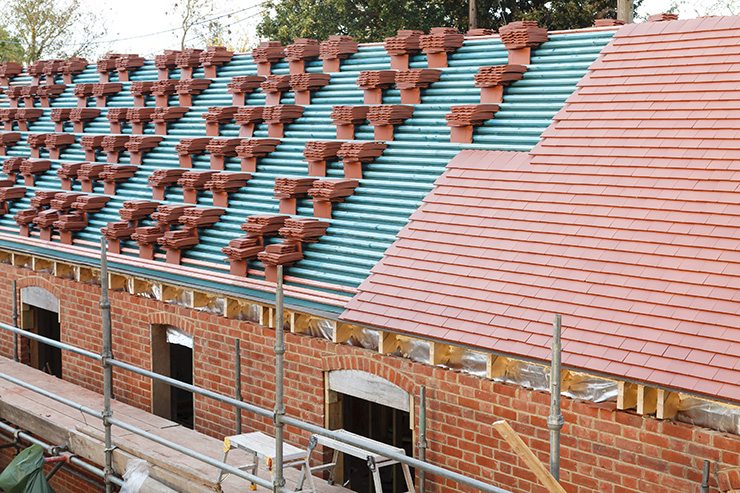
The good news is that a properly installed new roof will last you upwards of 20 years.
Keep in mind that the prices in this guide will always clarify where a sum includes cost of labour and materials, and where the price is referring to them separately. Lastly, the prices in this guide include VAT.
This guide shows you the cost of different roof replacements, according to the most common kinds of roofs found in the UK. Further down, this guide also includes cost of materials (per square metre), as well as the costs of standard repair jobs.
Can you repair a roof without replacing it?
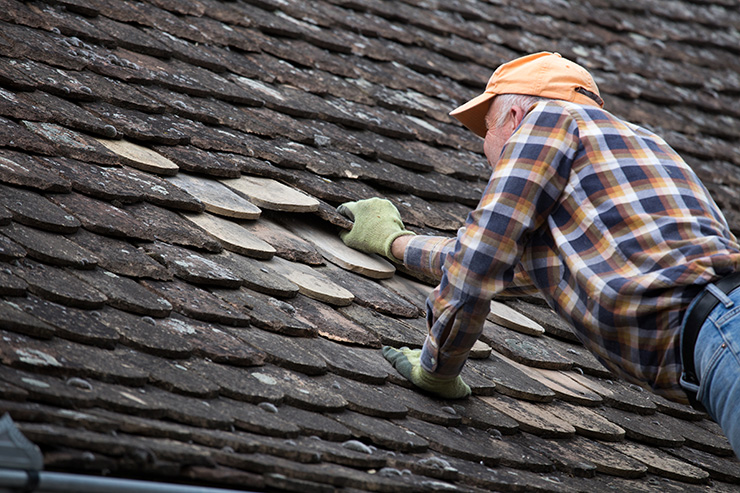
It’s important to have a sense of whether you actually need your roof to be replaced, or whether a roof repair will be enough. If your roof looks damaged, then you should hire a roofer to assess the situation.
If you’re not sure whether it’s time to replace your roof or not, here are a few things to look out for:
Warning signs
- Damaged tiles – if you can see missing or broken tiles on your roof, then you should get your roof inspected. This can happen due to bad weather, so always make sure to inspect your roof after heavy winds or storms. If there are only a few broken or missing tiles, a tradesperson will probably fix your roof rather than replace it. If the number of tiles that need changing is substantial, you might need a replacement instead
- Light filtering in – go and examine your roof from the inside. Can you see sunlight coming through the roof boards? If you can, you need to contact a roofing company as soon as possible
- Water damage – another sign that your tiles are worn out is damp, leaks, and other signs of water damage on your walls. This can be due to a leak in your roof, which can result in further damage to your home if you don’t have your roof inspected as soon as you can
- Sagging roof (on flat roofs) – a sagging roof can suggest that the boards supporting your roof are beginning to bend or break under the weight of water, usually as a result of extreme weather conditions. This destabilises the whole structure of your home, and could mean you will need to get your roof replaced urgently
- How long you’ve had your roof for – a well looked after roof can last 20 or more years. If in the last 20-25 years nobody has done any roof work or repairs on your roof, then you might be due for a replacement. A roof inspection is a good idea at this point
If one or more of these signs are causing significant damage to your roof, then it’s likely that a repair won’t be enough. At this point, you will need to have a whole new roof installed.
Find a rated roofer near you and submit your job for free!
How much does it cost to replace an entire roof?
The average cost of a roof replacement is £13,500. At the high end, you might end up spending around £20,000, whereas a small roof replacement could cost as little as £3,000. It depends on the size of your roof, the quality of your materials, and the design.
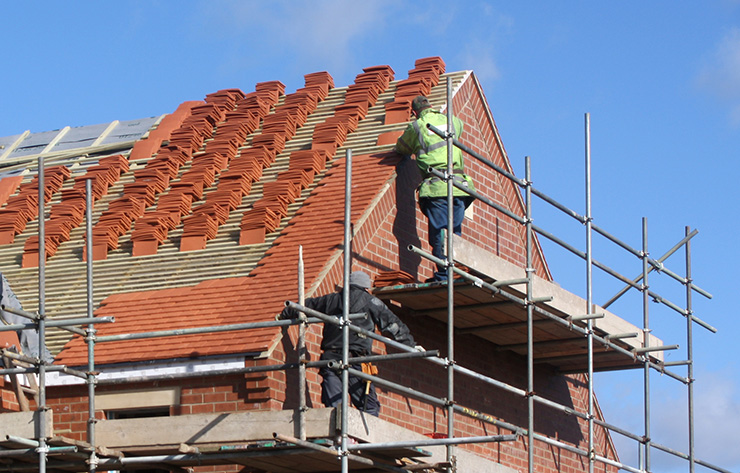
In 2021, 93% of roofers said they raised their prices due to material shortages, the impact of COVID-19, and an increased demand for work.
With this in mind, the average roof installation will cost a UK homeowner roughly £13,500.
A large, more complex roof replacement can cost you as much as £20,000 or even more, whilst on the lower end, a smaller flat roof replacement (such as for a garage roof) could cost as little as £3,000.
This price is broken down into:
- Cost of materials (how much you spend will depend on your choice of materials)
- Cost of labour
Roof removal fees
You also need to factor in the price of having your old roof removed, which will cost around £850 or anywhere from £800 to £1,200. Your current roof will be stripped and disposed of before replacement work begins.
You may be given an additional fee for scaffolding, though this is often included in your quote when you hire your tradespeople. How high up and wide your roof is will affect costs. It usually costs around £2,280 to hire 14m scaffolding with two lifts. This price will vary depending on how high up your roof is, how wide you need your scaffolding to be, and where you live in the UK. The number of working levels needed, and how easy your roof is to access, can also raise or lower prices.
For an accurate quote, get into contact with some skilled roofers, and make sure to ask what is included in your package.
You will also need skips to safely dispose of your old roof. A good rule of thumb for skip hire is that one tonne of rubbish is equal to one cubic yard. So six tonnes of waste would require a six yard skip. For a big project like roof removal, you will probably need two 6 yard skips. This will cost around £600.
With really old roofs, sometimes there might be asbestos involved. Removing this will also lead to further costs. Asbestos panels were used to build garage roofs between the 1950s and 1990s, before the long-term damaging effects of asbestos were discovered.
If you’re worried that your roof might have asbestos, you can send a sample to a certified asbestos testing lab. This is the best way you can make sure that your roof doesn’t contain harmful minerals.
Close section ↑Roof replacement cost breakdown
Most homeowners spend between £12,000 and £20,000 on a roof replacement.
| Type of Roof | Average Cost to Replace |
| Flat Roof | £3,000 |
| Hip Roof | £14,500 |
| Gable Roof | £13,500 |
| Mansard Roof | £18,500 |
| Lean-to Roof | £4,000 |
These five roof types are discussed in more detail below, including a look at materials, and upper and lower price ranges.
Whether you end up spending less than £5,000 or more than £18,000 will depend on the type of roof you have, as different styles have different price brackets. For example, mansard roofs cost more to replace, in comparison to flat roofs, that are cheaper. The size of your roof will also impact how much you end up spending.
Close section ↑Flat roof replacement costs
The average cost of a flat roof replacement project is around £3,000. Prices range between £2,400 and £3,500. The price will vary according to the materials you pick, where you live in the UK, and how easy it is for your builders to access your home’s roof.
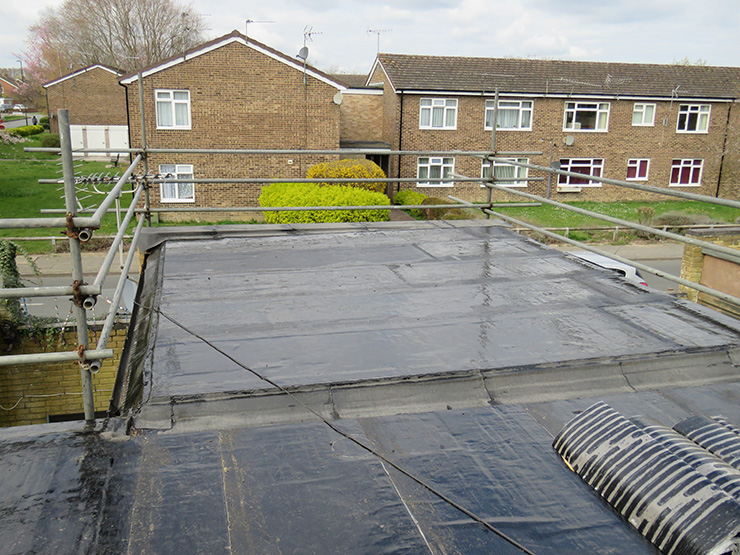
If you’re looking to have work done on a flat roof, then you’re in luck. Flat roofs tend to be the cheapest to replace. They’re not completely flat, but are actually slightly pitched, so that water can run down them and into the gutters. That’s why they’re usually made of highly water-resistant materials.
It’s unusual for a home to have a flat roof, because they tend to be used for small buildings, like garages, sheds, and extensions.
Flat roof replacements are quite straightforward, and usually take between 2-3 days. The most common types of flat roof materials are felt, fibreglass, EPDM rubber, and lead.
- A 4m x 5m flat roof with three layer torch on felt could cost you around £2,450 to replace.
- A 4m x 5m flat roof made of fibreglass could cost around £3,050 to replace.
- A 4m x 5m EDPM single ply membrane roof would cost you around £3,350.
These quotes include the cost of stripping the old roof, laying new decking and installing the new roof covering. They also include skip hire costs, but not any additional costs such as roof timber repairs.
How much does it cost to replace a garage roof?
A flat garage roof will be cheaper to replace than a flat roof on a building, with garage replacement roofs costing around £2,000 – £2,200.
Remember that, as with all roof replacements, the higher up the roof is, the more the replacement will cost. That’s why a one-storey flat roof replacement is cheaper than a flat roof on the third or fourth floor. This is because extra scaffolding and working at heights will incur bigger costs.
Close section ↑Hip roof costs
A hip roof will cost you roughly £14,500 to replace.
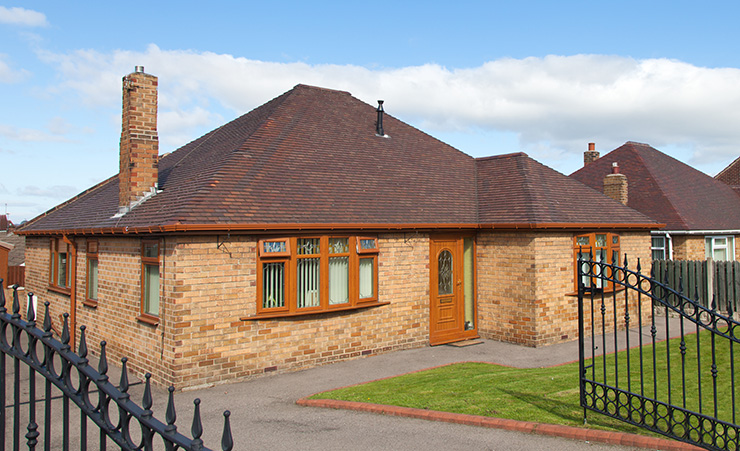
Hip roofs are a very common type of roof structure, where the roof slopes upwards from four different sides that meet in the middle.
There are two kinds of hip roof, the pyramid hip and the crossed hip. Pyramid hip roofs sit on square buildings, and have a single apex point where the four slopes meet. Crossed hip roofs sit on T, X, or L-Shaped houses, and have no gable ends (walls end at gutter level).
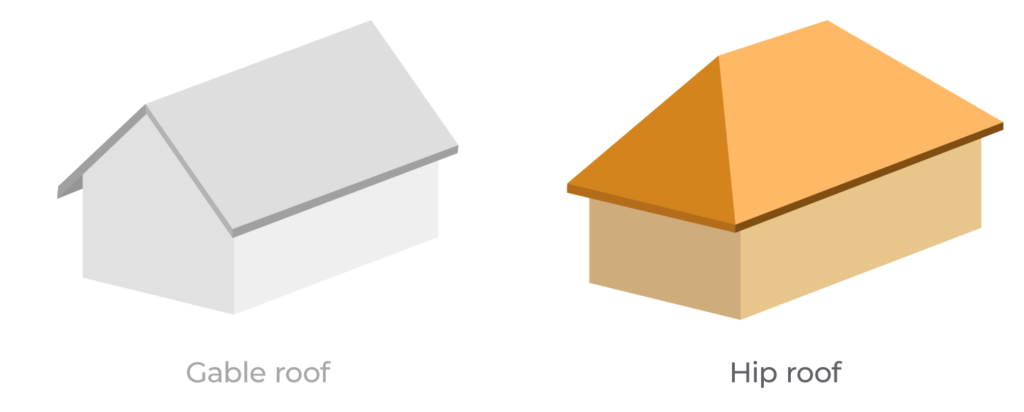
You can also get half-hip and hip and valley roofs, where the structure becomes more intricate. Keep in mind that the more unique your roof is, the more it will cost you to have it replaced.
For a standard pitched roof replacement, which requires some additional features and expertise, you might pay around £14,500, or within the range of £13,000 and £16,000, depending on the size and complexity of the project, and your choice of materials.
Gable roof costs
The cost of a gable roof replacement starts at around £12,000 but can reach £15,000, or even more, depending on your choice of materials and the size of your house. An average gable roof replacement costs £13,500, though additional costs need to be factored in as well.
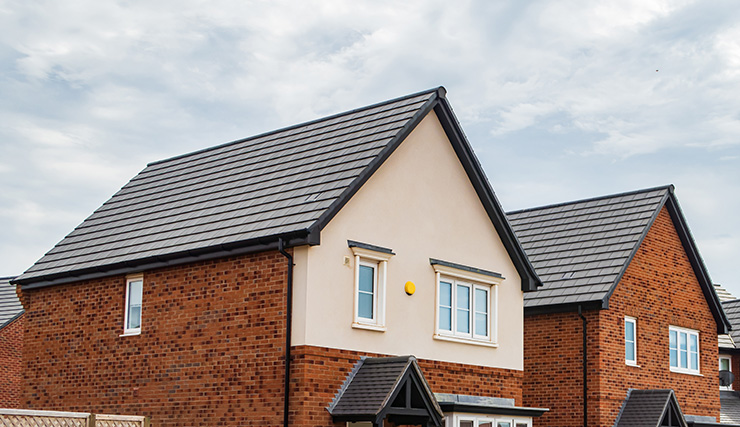
On a rectangular house, a gable roof is made up of two, same sized sloping roofs that meet in the middle. In other words, rather than a hip roof that has four sloping sides, a gable only has two, as illustrated below.
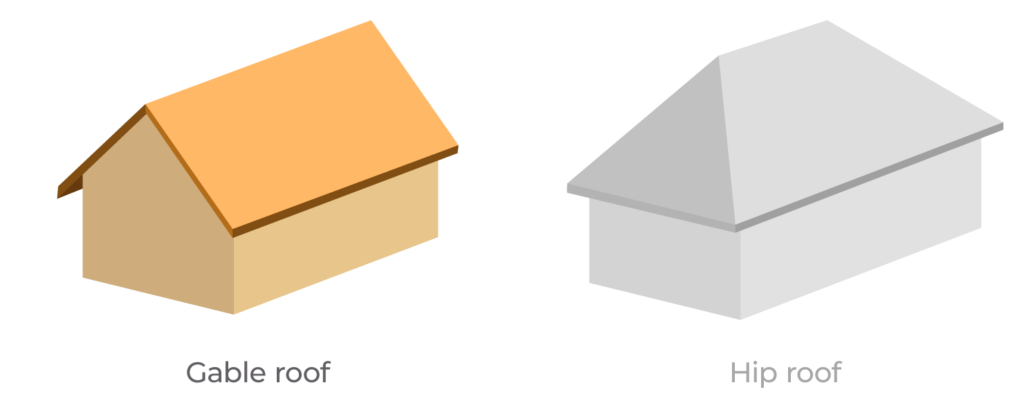
This type of roof is considered one of the most stable designs, and is therefore a very popular choice, especially since they tend to have larger loft spaces than hip roofs.
A gable roof replacement should cost you around £13,500 (within the £12,000 and £15,000+) bracket. These are just estimate sums though, as you might have to add on other costs for roof removal and other fees.
Mansard roof costs
A mansard roof replacement will cost you around of £18,500.
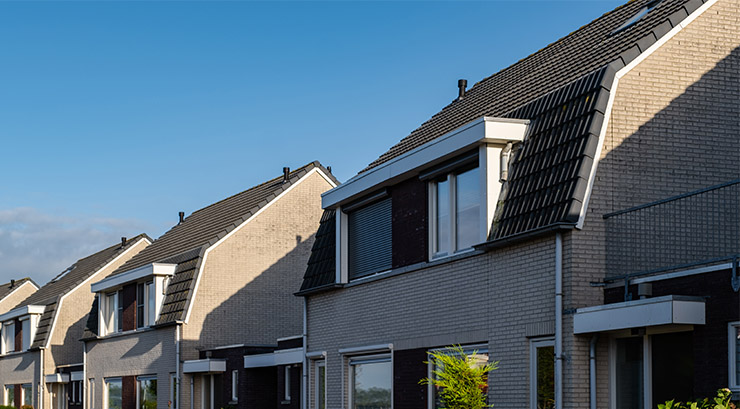
Mansard roofs maximise the amount of living space inside your home, and are made up of one shallow upper slope and one steep slope.
The cost of a mansard roof replacement is impacted by the steepeness of your roof, its size, and the quality of materials.
Note that asphalt shingles are not recommended for mansard roofs, because it’s really hard to stop shingles from sliding down the side of your roof, due to its vertical slope structure and the weight of asphalt shingles. A skilled tradesperson can nail your shingles down or use a sealer, but we don’t recommend you use them. Synthetic shingles are a better fit, but they do, on average, cost a bit more.
Due to the complexity of a mansard roof, a replacement will cost you around £18,500, and can reach even larger sums depending on individual project requirements. Expect a cost range of around £17,000-19,000.
Close section ↑Lean-to roof costs
A lean-to replacement roof will cost you around £4,000.
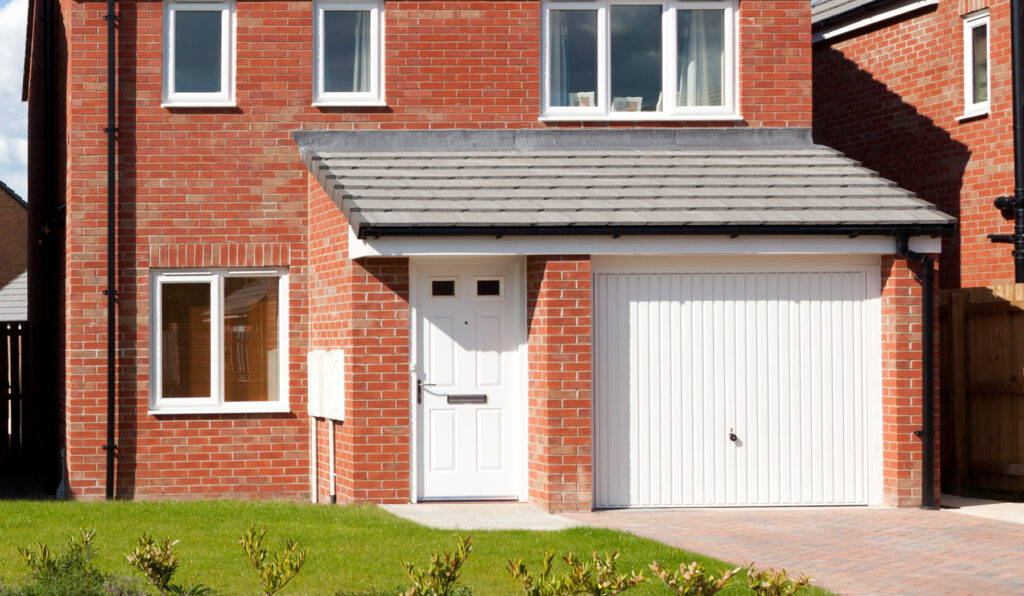
Also known as a pentroof or shed roof, these are the easiest type to build, and have a single slope and roof surface.
They’re typically found on extensions, such as conservatories or garages, and usually cost between £3,000 and £5,500.
This price range depends on the materials used for your conservatory, lean-to roof:
- Polycarbonate roofs cost around £3,000 (3,000mm x 3,500mm) or around £5,000 (4,000mm x 4,000mm)
- Glass roofs cost around £3,500 (3,000mm x 3,500mm) or £5,500 (4,000mm x 4,000mm)
Lean-to roof replacement costs range according to choice of fittings and size, but expect to pay upwards of £3,000. For an accurate quote, contact a skilled tradesperson.
Different roofing materials
The price of your roof replacement will depend a lot on which materials you decide to use. The below guide includes all the most common roofing materials, as well as their benefits and limitations.
The two sets of materials that matter here are for the base layer and the finishing layer of your roof. The most important decision for you to make is the type of material you want as your finishing layer. This can range from asphalt shingles to clay tiles, and a lot of other options, too.
Different roofing materials
| Material | Pros | Cons |
| Concrete tile roof | Variety of designs / colours Long-lasting (up to 50 years!) Fire-resistant Low maintenance Affordable to install | Brittle, prone to cracking Difficult to install |
| Asphalt shingle roof | Lightweight and waterproof Economical Looks good Durable (up to 50 years!) Keeps condensation out well Easy to replace | Prone to weather damage, in particular high winds and freezing temperatures |
| Rubber slate roof | Looks good Environmentally friendly (made from recycled rubber) Long-lasting and low maintenance | Not fire resistant Distinct smell (during installation) |
| Clay tile roof | Long-lasting Fire and weather resistant Low maintenance Comes in a range of colours | Difficult to install Heavy material Prone to cracking |
| Slate tile roof | Aesthetic and durable Can last up to 15 years Come in lots of sizes and colours Rot resistant | Expensive Difficult to install Breaks a bit more easily |
| Fibreglass roof | Can last up to 25 years Very durable (can be walked on) | More expensive Should be installed by a specialist Slippery when wet |
| EPDM rubber roof | Long-lasting and durable Lightweight Bespoke design Low maintenance | Harder to install Can be harder to find an installer |
| Felt roof | Affordable Installation methods have improved, so felt roofs last longer now than before Easy to repair | UV damage and cracking High maintenance |
| PVC roof | Lightweight Flexible and resistant to extreme weather/UV rays If maintained and installed properly, can last for over 30 years | Prone to shrinkage |
| Concrete roof | Versatile Very little maintenance Fire-resistant | Not as long lasting Prone to moss growth Not great in bad weather |
| Steel roof | Can last up to 70 years A second layer can be added to reinforce Comes in lots of colours, shapes, and finishes Lightweight | Quite noisy Dents easily |
| Solar tile | Aesthetic Durable and stylish Good for the environment | Roof needs to be correctly angled towards the sun More expensive Produce less energy than solar panels |
Not all materials can be used on all projects. A roofer can help you decide which you should choose, according to your budget and priorities.
If you only want one part of your roof fixed, for instance your soffits and fascias, then we can help you find a skilled tradesperson, like a local UPVC soffit and fascia replacement specialist, to help you out.
Close section ↑What is a green roof?
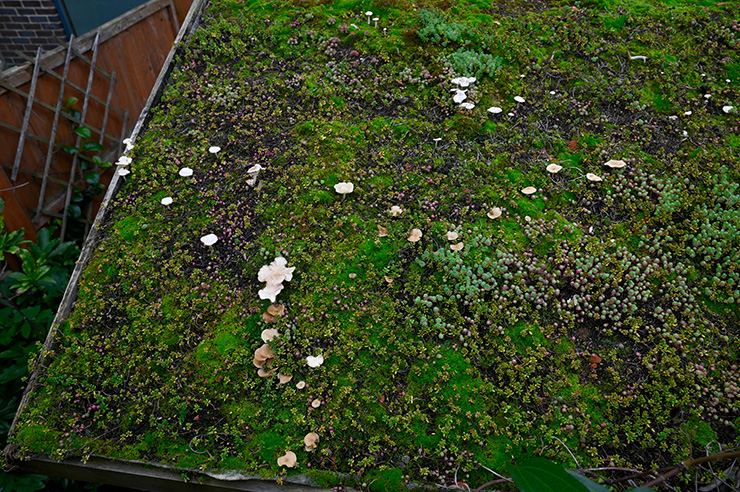
Green roofs are one of the most popular eco jobs being done right now. And why wouldn’t they be?
Partially or completely covered in plants, a living roof can revitalise your home and reduce energy costs by boosting your roof’s thermal performance and insulation.
A green roof can even extend the life expectancy of your roof by protecting the waterproof membrane underneath the greenery. The vegetation on your green roof will store water and release it back into the environment naturally, improving your roof’s drainage system as well.
Specialist companies make vegetation blankets that are ready-to-install as a top, protective roof layer. There are plenty of options depending on what plants you prefer, and they’re fairly easy and quick to install.
What you decide to go for will impact on costs. You could pay between £50 and £200 per m2, with an average of around £75 – £130 per m2.
There are plenty of reasons to invest in a green roof, from the fact that they look beautiful, to their practical, energy saving, and eco-friendly benefits.
Close section ↑How much does it cost to buy and install a skylight?
On average, a roof window will cost you between £1,100 and £3,000.
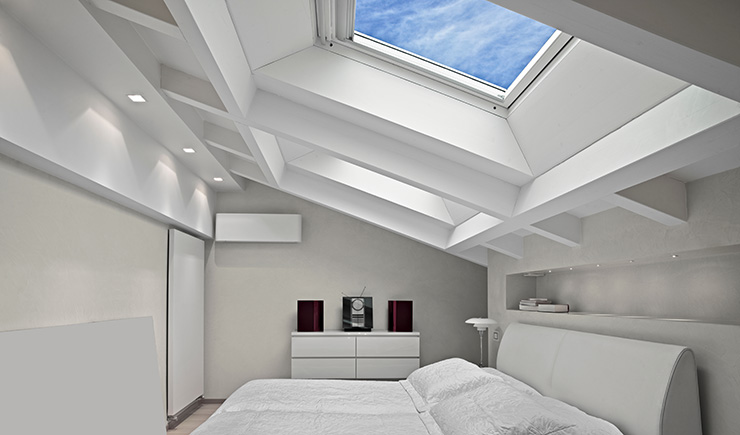
A new skylight or roof window could add a lot more natural light to your home, improving ventilation and helping you cut down on your energy bills.
How much you spend installing a new skylight or velux window depends on the type of window you want, and the size you want it in.
Cost of a velux window?
If your roof window is easy to access from the outside, then a velux window might be a good idea, as they have additional security features like reinforced structures and additional locks.
Small: £1,100 – £2,500
Large: £1,500 – £3,000
Cost of a roof dome?
Roof dome windows maximise the amount of light coming into your home, so if this is a priority for you, then you should consider getting one of these. They’re usually found on flat roofs.
Small: £1,250 – £2,550
Large: £1,350 – £2,750
Cost of a flat roof skylight?
Flat roof skylights let in twice as much light as vertical windows. You may need planning permission to install a flat roof skylight, though, so factor this in.
Between £1,400 – £2,700
Cost of a pyramid skylight?
Shaped like a pyramid, pyramid skylights fit all kinds of roof styles, and are a modern solution for letting in lots of natural light.
Between £1,350 – £2,650
Cost of a electric powered window?
Electric powered windows allow you to open and shut roof windows with a remote, allowing you to control your home’s ventilation easily.
Between £1,100 – £2,400
These costs reflect the price of materials and skilled labour, but exclude VAT.
Close section ↑Roof insulation
Roof insulation is a top 10 most popular eco-upgrade. Not only can roof insulation help you save money, it will also help you live more sustainably and reduce your carbon footprint.
In the long term, it’s a great financial decision.
The most common kind of roof insulation is insulation panels, that cost around £25 per m2. Warm and cold deck insulation tends to cost around £35 per m2, whilst exterior insulation tends to cost around £80 per m2.
The average cost of insulating your whole roof is around £600 – £2,500. How much you end up paying will also depend on where you live in the UK. Cost of labour rises in London and the Southeast.
Find a skilled roof insulation specialist and submit your job for free.
Do I need planning permission for a new roof?
If you are simply removing an old roof and installing a new one, then you won’t need permission, as re-roofing is considered to be permitted development.
If, however, your roof is seriously damaged, you might need to complete some structural repair work before your new roof is placed. You will also need permission if you plan on extending the height of your existing roof, or if your new roof projects more than 150 millimetres from the plane of the existing roof slope.
For more information, visit the Planning Portal website on re-roofing.
Close section ↑How long does roof replacement work take?
- It should take roughly a day to remove your old roof
- 1 to 2 days to install roof vents
- 2-3 days to lay the new roof and ridge tiles
- About a day to remove scaffolding and clean up the site
Add it all up, and the average roof replacement takes approximately 4-7 days to complete. Weather can delay this, whilst bigger projects can take longer.
Close section ↑Roof repair costs
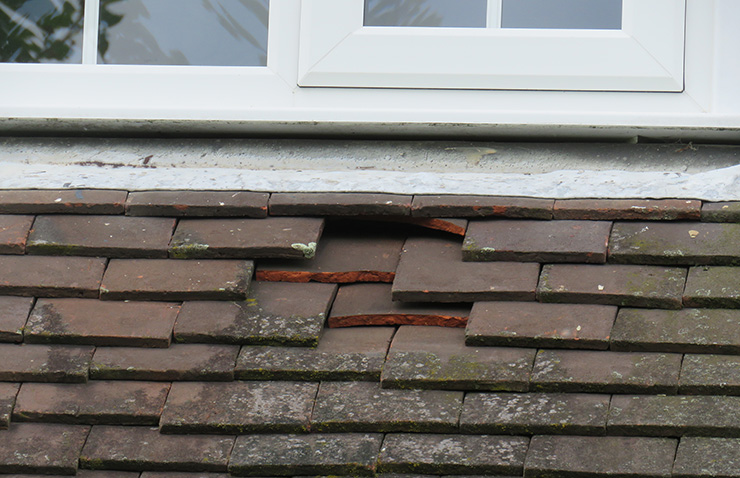
You might find that your roof doesn’t need a replacement just yet. It could, however, be due for a repair.
There are several kinds of roof problems that could need a roof repair. These include:
Necessary repairs
| Repair Type | Details | Cost | Time-frame |
| Leaking Roof Valley | Rain water travels down the roof valley, towards the gutter. It’s therefore prone to water damage, and can sometimes start leaking over time. | Around £350 | Half a day |
| Leaking Flat Roof | Flat roofs are more likely to get damaged and begin leaking than pitched roofs. They also suffer damage from heat and moss growth. | Around £100 per m2 | Depends on cause of leak, can vary |
| Replacing damaged tiles | Broken or missing tiles can lead to leaking and structural damage, and need to be replaced as soon as possible. | To replace 1 tile ridge: around £95 To replace 6 missing ridge tiles: around £175 To repair or replace up to 6 damaged tiles: around £150 | A few hours |
| Flashing repair | Lead flashing is the stuff around the edge of your roof that connects brickwork and tiles. This can become damaged, leading to leaks. | Around £200 – £250 per m2 | 3-5 days, depending on size of the roof |
| Sagging roof | When the timber frame fails to properly hold up the weight of the roof material, this can cause your roof to sag. | Additional joists cost between £1,000 and £2,000. If the issue is to do with the internal structures of your roof becoming waterlogged, then you might need to replace the roof entirely, though individual beams can be replaced for £250 – £500 | Can take up to 1-2 weeks, depending on extent of damage |
| Gutter cleaning | Your gutter can become clogged with dirt and debris, causing a failure of proper drainage from the roof. This can cause leakage, and other damage, to your home. | Between £35 and £85 | 2-4 hours |
| Fitting a vent on the roof | Roof vents regulate temperature levels, and can prevent condensation from building up, causing damage to your home. They also lower your energy bill, so they are definitely worth having. | Around £240 pounds | A day |
| Replacing soffits and fascia | Wood soffit and fascia are susceptible to moisture damage, rot, cracking and warping. This can cause damage to your gutters and roof ventilation. | For a 3 bed bungalow, around £1,900 (that is, between £1,250 and £2,280) | 1-2 days of work |
| Roof Repointing | Repointing is what keeps your tiles in place. Over time, it will need replacing. | Roof repointing cost can range between £500 and £2,000, depending on the size of your roof | 2-3 days (entire roof) |
You may also need to add the cost of hiring scaffolding and skips to this as well.
If your roof is failing to keep water out, and leaks continuously, then a simple roof leak repair cost won’t be enough. The longer you wait, the more damage you will cause to your home, raising the prices further down the line.
Close section ↑How much does roof cleaning cost?
Roof cleaning can cost anywhere between £9 and £15 per m2.
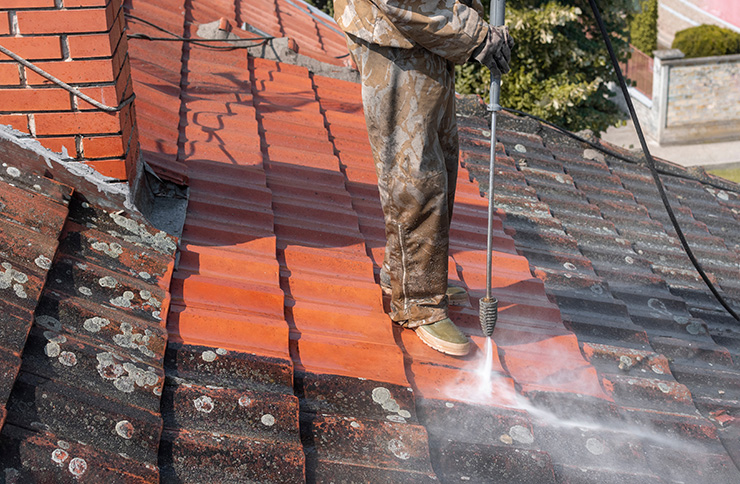
It’s really important that you keep your roof clean, as neglecting it can cause structural damage and block the drainage system. The main thing a roof cleaning does is get rid of moss, which grows on many roofs, especially north-facing ones.
It’s one of the many ways you can look after your property, and you should always make sure your roof and gutters are clear of rubbish and plant growth.
One of the main things that impact the cost of roof cleaning is how accessible it is for the cleaning crew. You will usually be charged per m2. Additional costs, such as the cost of hiring scaffolding, is not included in the below prices.
Roof moss removal cost
Soft washing – around £15 per m2
Steam cleaning – around £12 per m2
Pressure washing – around £9 per m2
Hand-removal and biocide treatment – around £12.50 per m2
You could pay anywhere between £500 and £1,000 to get your roof cleaned. It will usually be completed within a day.
Steam cleaning is sometimes favoured over pressure washing, as there is a small risk that your tiles could get damaged due to high water pressure. If you’re unsure, consult a professional about what kind of cleaning your roof needs.
Is it worth getting your roof cleaned?
Getting your roof cleaned is definitely a good idea. Moss can grow in between tiles, dislodging and damaging them. Moss also causes a build up of water retention, which can lead to roof leaks. Not to mention that moss is unattractive, and can make your home look untidy from the outside.
Considering how many problems moss can cause to your home, it’s definitely a good idea to clean it regularly, in order to prevent moss from covering your tiles.
Keep in mind that you might also want to hire a post construction cleaning specialist to come and clean the site around your house after you have it replaced. They won’t clean the roof itself, but will deal with the effects of construction to your property.
Close section ↑Here’s 5 ways you can lower roof replacement costs
Saving money doesn’t have to mean compromising on quality. The below budget-friendly tips will help you make the most of your money…
- Ask for multiple quotes – we recommend you ask for at least 3 quotes but potentially as many as 5-8 so that you can get a good sense of what prices are, in terms of labour and materials. Make sure you also check what is included in the package, so you know exactly what you’re paying for
- Time of year – People tend to do their re-roofing during the summer, because of weather conditions. This is also when roofers are most in demand, making them more expensive. Doing your roofing in the spring could get you some lower quotes
- Avoid waste – hire a professional to come and assess your roof. We recommend you do this, so that you can get a sense of the exact materials you will need. Doing this will enable you to avoid buying more than you need, wasting your money
- Check with your insurance company – getting a roof inspection after a storm could save you a lot of money, as weather-related damage is sometimes covered by insurance. This would help you avoid paying for the whole thing yourself
- Reuse existing tiles – don’t throw away tiles on your roof that are in good condition. These can be reused on your replacement roof, saving you money
Conclusions
Whether or not you’ll need a roof repair or replacement will depend on your roof’s condition, and how damaged it is. It’s important that you look after your roof, carrying out maintenance work and cleaning periodically to avoid your gutters getting clogged up, or dislodged tiles causing a leak.
How much you end up spending will depend largely on where you live in the UK, how large your roof is, and your choice of materials. The higher up your roof is from ground level, the more additional costs you will have to factor in.
Some of the biggest mistakes homeowners make when it comes to their roof include:
- Delaying on getting their roof inspected when they notice damage
- Trying to cut corners to reduce costs
- Not doing research before hiring tradespeople
- Not doing research on what a roof replacement involves before getting their roof done
If your roof needs work, don’t postpone a replacement. This will only lead to you having to pay more down the line, when your roof problems cause more damage. There are definitely ways you can save money, but cutting corners can actually cost you in the long run, and it’s always better to invest in good quality products and skilled labour.
If your roof is damaged, prioritise getting a consultation on your roof as soon as possible.
You can do so here:
*The Rated People cost guides are produced in collaboration with the quote-building platform PriceBuilder, and a range of tradespeople across the 30+ trades on our platform were consulted. Please note that the prices included are for guidance only – how much you end up spending will depend on the specific requirements of your project.




